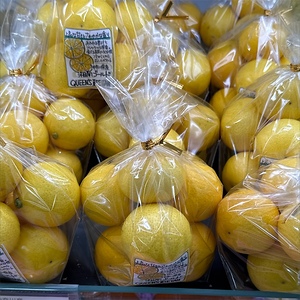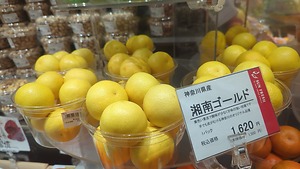


Shonan Gold Citrus
Estimated Inventory, lb : 0
Description/Taste
Shonan Gold citrus is a small to medium-sized fruit, typically round or slightly oblong in shape. This citrus generally measures around 5 to 7 centimeters in diameter. It has smooth, vibrant golden-yellow skin that’s covered in yellow lenticels. The flesh of Shonan Gold is juicy and sweet, segmented into about 8 succulent wedges of pulp that are visibly more similar to an orange than a lemon. This flesh has a crisp, crunchy texture and a small number of seeds within. The fruit's sweet, aromatic scent is complemented by a bright, tangy citrus flavor. Shonan Gold citrus combines the sweetness of a mandarin with the tartness of a lemon as well as notes of a rich, pineapple-like flavor.
Seasons/Availability
Shonan Gold citrus is available during the spring.
Current Facts
Shonan Gold citrus is botanically known as Citrus flaviculpus × Citrus unshiu and belongs to the Rutaceae family, which includes all citrus fruits such as limes, lemons, citrons, oranges, and grapefruit. Its compound botanical name comes from the fact that this variety is a hybrid of two Japanese oranges, the Ogonkan and the Imamura unshiu. Shonan Gold citrus resembles a lemon because, despite its orange parentage, the Ogonkan variety also has a bright yellow color. Shonan Gold citrus embodies the sweetness of an orange, ranking about 12 to 13 degrees on the Brix scale. There are many citrus varieties that come from Japan, including Mikan, Iyokan, Yuzu, Kinkan, Kabosu, Sudachi, Shikuwasa, and Daidai. All of these varieties, including Shonan Gold citrus, are primarily valued for their culinary qualities and are well-suited for Japanese dishes.
Nutritional Value
Shonan Gold citrus is a rich source of vitamin C, which helps boost the immune system and supports skin and eye health, tissue repair, iron absorption, and collagen production. This vitamin also reduces inflammation and acts as a potent antioxidant, protecting cells from free radical damage. The fruit is a good source of potassium, essential for maintaining healthy blood pressure, supporting heart function, balancing electrolytes in the body, and controlling nerve and muscle function. Shonan Gold citrus contains dietary fiber, which aids in digestion, promotes a healthy gut, lowers cholesterol levels, increases feelings of fullness, and helps regulate blood sugar levels.
Applications
Shonan Gold citrus is ideal for eating fresh as a snack, either peeled and sectioned or sliced into wedges. It can also be juiced, puréed, or zested. The fruit's bright flavor complements salads with ingredients like nuts, avocados, and tangy vinaigrettes. This variety may be incorporated into salsas, marinades, citrus glazes, and popsicles. It is often selected for desserts like sorbet, fruit tarts, pies, panna cotta, and custards. Shonan Gold can be juiced to create refreshing drinks like margaritas, cocktails, or smoothies with sweeter fruits like bananas, papayas, strawberries, and cherries. Shonan Gold citrus pairs well with grilled fish, chicken, roasted meats, tomatoes, onions, cilantro, jalapeños, spinach, yogurt, cream, honey, and maple syrup. It can be stored at room temperature for about a week or in the refrigerator for up to three weeks.
Ethnic/Cultural Info
Shonan Gold citrus is highly valued in Kanagawa Prefecture, Japan. Its distinctive flavors were showcased at the Kanagawa Fair, a celebration of innovative food products from the region. The fair aimed to promote the export of these products to Singapore. At this celebration, there were jellies made from Shonan Gold citrus, as well as sweet drops sold in metal tins, honey, candies, craft beers, and wines. The fair coincided with springtime, a period when cherry blossoms bloom in Japan and when Shonan Gold citrus is harvested.
Geography/History
Shonan Gold citrus was developed in Kanagawa Prefecture, Japan. The cultivation process began in 1988 at the Kanagawa Agricultural Technology Centre in Odawara, where the Ogonkan and Imamura Unshu citrus were bred together over the course of about a decade to achieve the ideal taste for the Shonan Gold. It was registered as a variety in 2003 by Japan’s Ministry of Agriculture, Forestry, and Fisheries. As a hybrid, Shonan Gold citrus is not found in the wild but is produced commercially in its native region. This fruit requires warm, subtropical climates with full sun exposure and well-drained soils. Shonan Gold citrus is expensive and time-consuming to produce, being bred and grown only within Kanagawa Prefecture, Japan. This variety may be sold at local fruit shops and supermarkets in the prefecture but is otherwise a rare breed that may only be sourced from Asian markets outside this region.









